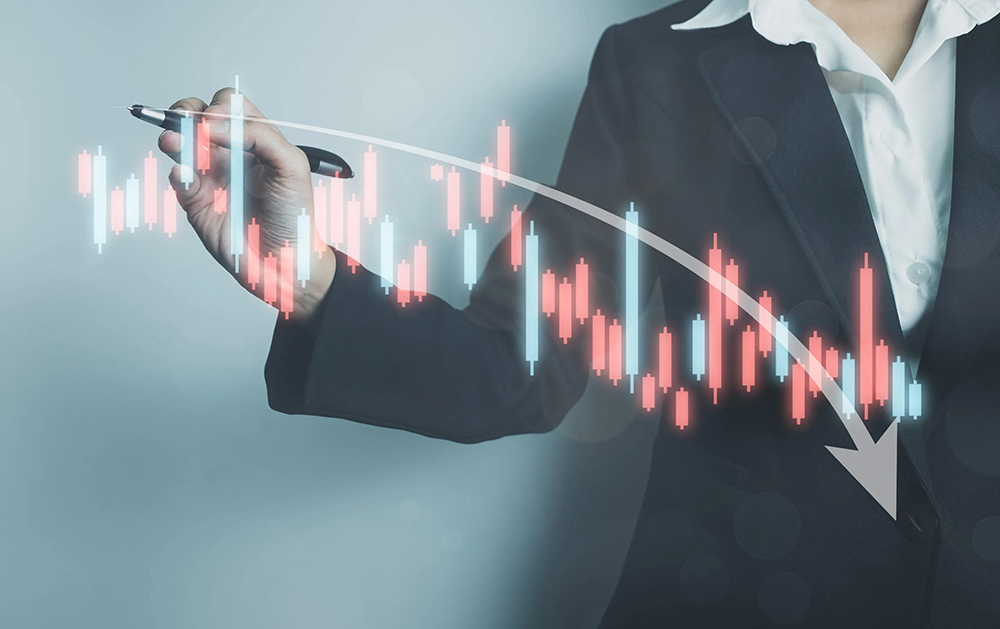
新兴市场已经做足了准备来抵御美国经济衰退,甚至还可能会吸引投资。
这是摩根大通(JPMorgan Chase & Co.)和德意志银行(Deutsche Bank AG)等资本管理公司发出的信息,尽管目前出于对全球最大经济体经济收缩的担忧,投资者纷纷涌向美国国债和其他避险资产。上述公司表示,尽管短期会出现波动,但发展中国家将因为估值低、收益率高、增速快尤其是中国的复苏而得到缓冲。
想一想当前新兴市场的亏损程度,这听起来像是天方夜谭。股市和债市都遭遇了20世纪90年代以来最严重的暴跌,货币也遭到有史以来最严重的冲击,甚至比2020年新冠疫情期间还要糟。那么,投资者为何还指望发展中国家能够在美国经济陷入衰退时表现出抗逆力呢?
“悲观情绪可能已经接近顶峰。”德意志银行负责中东欧、中东、非洲和拉丁美洲汇率研究的奥利弗·哈维表示,“我们有理由认为,新兴市场可能会比在过去的衰退中表现好,原因包括外资持有本地资产的比例非常低、利率起点相对较高,以及估值较低。”
历史表明,仅仅是对美国经济陷入困境的预期,就会早早引发整个新兴市场的抛售,因此当经济萎缩真正到来时,这些市场的估值处于低位。例如,美国在2009年6月才走出所谓的“大衰退”(Great Recession),但新兴市场的股票和债券在2008年10月就已经见底,彼时美联储(Federal Reserve)甚至还没有开始量化宽松。
这一次,新兴市场的抛售开始于2021年第一季度,比发达市场早了整整一年。
“相较于历史和发达市场的同类资产,新兴市场的资产很便宜。”晋达资产管理(Ninety One)的格兰特·韦伯斯特、维尔纳·盖伊·范·皮蒂乌斯和彼得·肯特在电子邮件中写道,“从目前的估值来看,轻度经济衰退的影响已经体现在定价中,而严重衰退——尽管不符合我们的基本判断——的影响也差不多被包含在内。”
中国——最大的激励因素
在投资者认为可以将美国经济萎缩的影响降至最低的所有因素中,中国的排名最高。随着中国政府逐步放松新冠疫情的防控措施,加上政策制定者开始放松货币政策,投资者押宝世界第二大经济体会在下半年出现反弹。
“如果中国仍然保持相当不错的增长,可能就会在一定程度上减轻人们对美国或欧洲经济衰退的担忧。”M&G Investments的新兴市场债务主管克劳迪娅·卡利奇表示,“尽管仍然存在潜在的宏观阻力,一些经济较弱的国家依旧可能面临困难,但整体价格和估值已经进行了非常大幅度的调整,很多负面因素已经反映在了价格里。”
最近对美国将放松对中国进口商品关税限制的新希望,也推动了市场情绪的改善。
然而,也有人怀疑,中国是否真的能够发挥这么大作用,防止新兴经济体免受美国衰退影响。
“中国从清零政策造成的封城中复苏肯定会有所帮助。”高盛集团(Goldman Sachs Group AG)的全球货币和利率研究联席主管卡马克夏·特里维迪说,“但对于它能否保护新兴市场完全免受不利影响,我持怀疑态度,不过肯定可以减轻影响。”
增长差异
摩根大通资产管理(JPMorgan Asset Management)的亚洲首席市场策略师许长泰(音译)表示,依赖对美欧出口的国家以及外部收支状况疲弱、实际收益率较低的国家,仍将很容易受到冲击,不过中国的需求能够为原材料出口国提供保护,因为中国是最大的买家。
德意志银行预计,发展中经济体的增长速度将继续超过美国,为本币提供支撑。
当然,各国情况不尽相同。德意志银行称,捷克和智利等国的增长风险正在上升,波兰等国的经济前景强劲,南非和墨西哥的复苏仍在继续。
总的来看,接受彭博社(Bloomberg)采访的经济学家预计,到2023年,新兴市场与发达市场的增速之差将翻一番,达到2.5个百分点。如果美国陷入衰退,那时追逐增长的投资者会给谁投资显然毋庸置疑。
“我们认为新兴市场不会出现大范围衰退,尽管我们的同事预计美国会面临这种情况。”哈维说。(财富中文网)
译者:Agatha
新兴市场已经做足了准备来抵御美国经济衰退,甚至还可能会吸引投资。
这是摩根大通(JPMorgan Chase & Co.)和德意志银行(Deutsche Bank AG)等资本管理公司发出的信息,尽管目前出于对全球最大经济体经济收缩的担忧,投资者纷纷涌向美国国债和其他避险资产。上述公司表示,尽管短期会出现波动,但发展中国家将因为估值低、收益率高、增速快尤其是中国的复苏而得到缓冲。
想一想当前新兴市场的亏损程度,这听起来像是天方夜谭。股市和债市都遭遇了20世纪90年代以来最严重的暴跌,货币也遭到有史以来最严重的冲击,甚至比2020年新冠疫情期间还要糟。那么,投资者为何还指望发展中国家能够在美国经济陷入衰退时表现出抗逆力呢?
“悲观情绪可能已经接近顶峰。”德意志银行负责中东欧、中东、非洲和拉丁美洲汇率研究的奥利弗·哈维表示,“我们有理由认为,新兴市场可能会比在过去的衰退中表现好,原因包括外资持有本地资产的比例非常低、利率起点相对较高,以及估值较低。”
历史表明,仅仅是对美国经济陷入困境的预期,就会早早引发整个新兴市场的抛售,因此当经济萎缩真正到来时,这些市场的估值处于低位。例如,美国在2009年6月才走出所谓的“大衰退”(Great Recession),但新兴市场的股票和债券在2008年10月就已经见底,彼时美联储(Federal Reserve)甚至还没有开始量化宽松。
这一次,新兴市场的抛售开始于2021年第一季度,比发达市场早了整整一年。
“相较于历史和发达市场的同类资产,新兴市场的资产很便宜。”晋达资产管理(Ninety One)的格兰特·韦伯斯特、维尔纳·盖伊·范·皮蒂乌斯和彼得·肯特在电子邮件中写道,“从目前的估值来看,轻度经济衰退的影响已经体现在定价中,而严重衰退——尽管不符合我们的基本判断——的影响也差不多被包含在内。”
中国——最大的激励因素
在投资者认为可以将美国经济萎缩的影响降至最低的所有因素中,中国的排名最高。随着中国政府逐步放松新冠疫情的防控措施,加上政策制定者开始放松货币政策,投资者押宝世界第二大经济体会在下半年出现反弹。
“如果中国仍然保持相当不错的增长,可能就会在一定程度上减轻人们对美国或欧洲经济衰退的担忧。”M&G Investments的新兴市场债务主管克劳迪娅·卡利奇表示,“尽管仍然存在潜在的宏观阻力,一些经济较弱的国家依旧可能面临困难,但整体价格和估值已经进行了非常大幅度的调整,很多负面因素已经反映在了价格里。”
最近对美国将放松对中国进口商品关税限制的新希望,也推动了市场情绪的改善。
然而,也有人怀疑,中国是否真的能够发挥这么大作用,防止新兴经济体免受美国衰退影响。
“中国从清零政策造成的封城中复苏肯定会有所帮助。”高盛集团(Goldman Sachs Group AG)的全球货币和利率研究联席主管卡马克夏·特里维迪说,“但对于它能否保护新兴市场完全免受不利影响,我持怀疑态度,不过肯定可以减轻影响。”
增长差异
摩根大通资产管理(JPMorgan Asset Management)的亚洲首席市场策略师许长泰(音译)表示,依赖对美欧出口的国家以及外部收支状况疲弱、实际收益率较低的国家,仍将很容易受到冲击,不过中国的需求能够为原材料出口国提供保护,因为中国是最大的买家。
德意志银行预计,发展中经济体的增长速度将继续超过美国,为本币提供支撑。
当然,各国情况不尽相同。德意志银行称,捷克和智利等国的增长风险正在上升,波兰等国的经济前景强劲,南非和墨西哥的复苏仍在继续。
总的来看,接受彭博社(Bloomberg)采访的经济学家预计,到2023年,新兴市场与发达市场的增速之差将翻一番,达到2.5个百分点。如果美国陷入衰退,那时追逐增长的投资者会给谁投资显然毋庸置疑。
“我们认为新兴市场不会出现大范围衰退,尽管我们的同事预计美国会面临这种情况。”哈维说。(财富中文网)
译者:Agatha
Emerging markets are well positioned to stare down a US recession and may even be able to lure investors their way.
That’s the message from money managers including JPMorgan Chase & Co. and Deutsche Bank AG even as fears of a contraction in the world’s largest economy spark a dash into Treasuries and other haven assets. Beyond the short-term turbulence, they say, developing nations will be cushioned by cheap valuations, higher yields, faster growth and above all, a resurgent China.
That sounds like a tall order given the current scale of losses in emerging markets. Stocks and bonds have been gripped by the sharpest slump since the 1990s, while currencies are suffering their worst losses on record, beating even the Covid rout of 2020. So why are investors expecting the developing world to show resilience when a US recession hits?
“We may be close to peak pessimism,” said Oliver Harvey, who heads currency research for central and eastern Europe, the Middle East, Africa and Latin America at Deutsche Bank. “There are reasons to think emerging-market performance could hold up better than in past recessions, including very low foreign ownership of local assets, a relatively high starting point for interest rates and cheap valuations.”
History shows that mere expectations of US economic trouble spark an early selloff across emerging markets and leave them cheaply valued when the contraction actually arrives. For instance, the US exited the so-called Great Recession only in June 2009, but emerging-market stocks and bonds had bottomed out in October 2008 itself, even before the Federal Reserve started quantitative easing.
This time, the selloff in emerging markets began in the first quarter of 2021, a full year before it started in developed markets.
“EM assets are cheap relative to history and to their developed-market peers,” Grant Webster, Werner Gey van Pittius and Peter Kent of Ninety One, wrote in an email. “Current valuations suggest that a mild recession is already priced and that a hard recession -- although not our base case -- is not far off being priced.”
Stimulus Nation
Of all the factors investors say would minimize the impact of a shrinking US economy, none ranks higher than China. They are betting on a rebound in world’s second-biggest economy in the second half as the government gradually eases Covid restrictions and policy makers loosen monetary settings.
“If China is still growing reasonably well, it could partially mitigate the fears of a US or Europe recession,” said Claudia Calich, the head of emerging-market debt at M&G Investments. “While there are still potential macro headwinds and some of the weaker countries may face difficulties, prices and valuations have already adjusted very significantly and a lot of the negative factors are already priced in.”
Fresh hopes that the US will ease tariffs on Chinese imports also contribute to the improved sentiment.
However, some doubt China could play an outsized role in shielding emerging economies from a US recession.
“A recovery in China from the zero-Covid-related shutdown would certainly be helpful,” said Kamakshya Trivedi, the co-head of global currency and interest-rates research at Goldman Sachs Group AG. “I doubt that it would completely shield emerging markets from the adverse effects, but it would mitigate the impact.”
Growth Differential
While countries that are dependent on exports to the US and Europe as well as those with weak external balances and low real yields will remain vulnerable, exporters of raw materials could be shielded by demand from China, which is the largest buyer, said Tai Hui, JPMorgan Asset Management’s Asia chief market strategist.
Growth in developing economies will continue to outpace the U.S., providing support to local currencies, according to Deutsche Bank.
Still, the picture is diversified. While growth risks are rising in countries like the Czech Republic and Chile, the outlook is strong in economies such as Poland and recoveries continue in South Africa and Mexico, the bank said.
Overall, economists surveyed by Bloomberg project that the rate at which emerging markets grow faster than developed markets will more than double to 2.5 percentage points in 2023. If and when the US slips into a recession, investors chasing growth may have little doubt as to where they must go.
“A broad-based emerging-market recession is not our baseline, even if our colleagues expect one in the US,” said Harvey.






